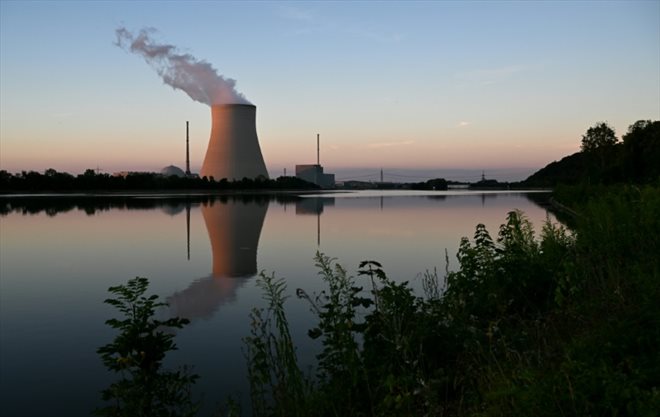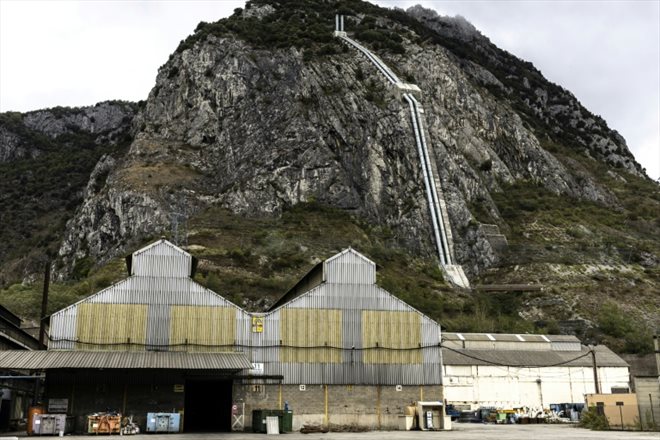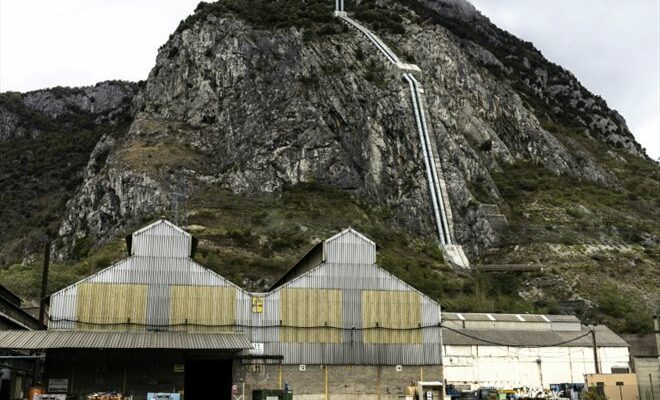A very high voltage line in Arêches-Beaufort, France, on September 8, 2022 (AFP / JEFF PACHOUD)
Brussels unveiled on Tuesday its ways to reform the European electricity market without fundamentally restructuring it, by using long-term energy contracts to protect consumers and encourage investment in renewables… and nuclear.
The differences between the Twenty-Seven, particularly around the role of nuclear power, could complicate negotiations on this text, even if the European Commission hopes for an agreement by winter.
With wholesale electricity prices dependent on the cost of the last power plant used to balance the grid, mainly gas-fired power plants, the market soared last year in unison with gas prices following the war in Ukraine.
But rather than a complete overhaul and strict gas/electricity decoupling, which France and Spain initially called for, the Commission intends to develop long-term contracts “for low-carbon energies”, allowing consumers to smooth their invoice while providing predictable revenue to suppliers.
In fact, all the Member States remain attached to the “short-term” functioning of the market which, being highly interconnected, makes it possible to respond quickly to peaks in demand on a continental scale. Seven countries, Germany in the lead, opposed any systemic reform “as a matter of urgency”.
The project proposed on Tuesday, which will be negotiated between Member States and MEPs, also aims with these “long-term signals” to encourage investment in low-carbon energies, thus reducing the influence of gas prices.
Until then, “we must structure the contracts (…) in such a way as to decouple citizens’ bills from prices on the short-term wholesale markets”, observes the European executive.
– “Good basis for discussions” –
Brussels wants to facilitate the deployment of PPAs – over-the-counter electricity purchase contracts between two private players (producer and consumer) at a price decided in advance – so that companies “benefit from more stable prices for the production renewable and non-fossil energy”.
States should establish public guarantee schemes to cover buyers’ credit risks, allowing more companies to take out these contracts.

The Essenbach nuclear power plant in Germany on August 3, 2022 (AFP/Archives/Christof STACHE)
Retail electricity suppliers should cover themselves “appropriately” with PPAs in order to “mitigate their risk of overexposure to price volatility”.
The Commission also supports the use of “contracts for difference” (CFD) with a price guaranteed by the State: in this mechanism, the electricity producer must pay back the income earned if the spot price is higher, but contrario is compensated in the event of a fall in the market.
Such a system is already possible, and applies to most renewables in France.
But now, as part of any public support “for new investments in the production of low-carbon electricity, without fossil fuels”, States would be required to use these CFDs and should “channel excess revenue to consumers” – two new conditions.
The application of “low-carbon” CFDs was a strong request from France, anxious to use them to finance the civil atom.

Water supply to an EDF hydroelectric power station near Tarascon-sur-Ariège, France, September 9, 2022 (AFP/Charly TRIBALLEAU)
Another satisfaction for Paris, Brussels proposes that CFDs also concern re-investments in existing power plants, to boost their capacity or extend their existence. They could therefore contribute to the “great fairing” of the French nuclear fleet.
“The proposal constitutes a very good basis for discussion”, welcomed the Ministry of Energy Transition.
Conversely, Berlin and six other countries demanded optional CFDs strictly reserved for new renewable infrastructures.
– Flexibility –
Between PPA and CFD (cumulative), producers of renewables and nuclear “will continue to be active on the short-term market, but the volatile price of this market will no longer determine their income”, summarizes Brussels.
The text also intends to strengthen consumer information, toughen penalties for infringement of competition or market manipulation, and better protect vulnerable customers – who could no longer be disconnected in the event of late payment.
Regulated prices may be offered by the States to households and SMEs “in the event of a crisis”.
Finally, to better respond to peaks in demand, the States will have to assess their needs for “flexibilities” over the next five years, and will be able to generalize the “capacity mechanisms”, in which is remunerated not production, but the available capacity of a central. The text also extends the possibility of being remunerated in exchange for a reduction in consumption.
© 2023 AFP
Did you like this article ? Share it with your friends with the buttons below.




